|
Tet Offensive in Vietnam
1968
|
3 February Military History Office Dr. Saunders
It was thirty years ago that the Tet Offensive (named General Offensive-General Uprising by the North Vietnamese) began in South Vietnam. Although intelligence estimates indicated an unprecedented amount of supplies were moving down the Ho Chi Minh Trail and three North Vietnamese Division Headquarters and seven regiments (about 15,000 men) had arrived near Khe Sanh, north of Hue, the U.S. leadership did not fully understand the gravity of the situation. Speeches by senior leaders indicated that a possible all-out offensive might develop, but it was unlikely.
Tet, or the lunar new year, the Vietnamese most festive holiday, resulted in a declared 36 hour truce and home leave for many of South Vietnam's military. Although some leaves were cancelled, ARVN strength was at about 50 per cent when the attacks were launched on five of the most important cities in South Vietnam, thirty-six provincial capitals, sixty-four district capitals, and fifty hamlets. In the city of Hue, eight battalions stormed the city isolating the U.S. Advisory team. In well-coordinated attacks in the capital of Saigon, three U.S. military barracks, the Presidential Palace, the city radio station, Ton Son Nhut Air Base, and the recently constructed U.S. Embassy were all attacked.
American soldiers, on alert for the possible attacks, reacted quickly and well and fought stubbornly in small units. The battle for the northern city of Hue went from house to house and lasted for a month. The North Vietnamese lost 45,000 men, over half of the strength they committed, and were unable to attack in strength for the next two years. The American public, watching graphic footage on the televised evening news, began to question the Johnson administration's handling of the conflict.
The Tet offensive brought the war to the cities for the first time and the resulting devastation created many refugees. GEN Westmoreland moved quickly to establish Operation Recovery to coordinate the rebuilding process. While the North Vietnamese failed in their attempt to start a mass uprising in the cities, they controlled the villages and the countryside, making the U.S.-led Pacification program more difficult.
The Tet offensive of 1968 demonstrated that despite the element of surprise, American soldiers were able to repel determined and well coordinated attacks. Small unit tactics, excellent NCO leadership, and determination of the soldiers were able to turn the tide for the Americans.
|
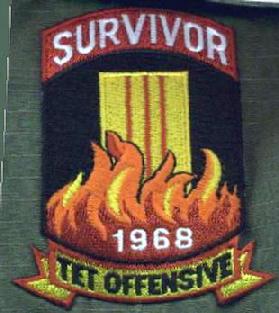 |
| 1968 TET Offensive Survivor Patch |
|
|
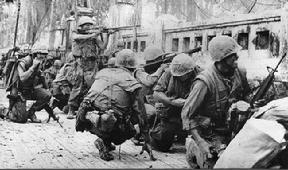 |
| Tet Offensive in Vietnam, 1968 |
|
|
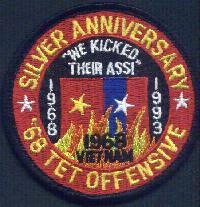 |
| 1968 TET Offensive Silver Anniversary Patch |
|
|
Tet Offensive in Vietnam
1969
coming soon
|
|
President Johnson's Speech at Johns Hopkins University
Last week 17 nations sent their views to some two dozen countries having an interest in southeast Asia. We are joining those 17 countries and stating our American policy tonight which we believe will contribute toward peace in this area of the world.
I have come here to review once again with my own people the views of the American Government.
Tonight Americans and Asians are dying for a world where each people may choose its own path to change.
This is the principle for which our ancestors fought in the valleys of Pennsylvania. It is the principle for which our sons fight tonight in the jungles of Vietnam.
Vietnam is far away from this quiet campus. We have no territory there, nor do we seek any. The war is dirty and brutal and difficult. And some 400 young men, born into an America that is bursting with opportunity and promise, have ended their lives on Vietnam's steaming soil.
Why must we take this painful road?
Why must this Nation hazard its ease, and its interest, and its power for the sake of a people so far away?
We fight because we must fight if we are to live in a world where every country can shape its own destiny. And only in such a world will our own freedom be finally secure.
This kind of world will never be built by bombs or bullets. Yet the infirmities of man are such that force must often precede reason, and the waste of war, the works of peace.
We wish that this were not so. But we must deal with the world as it is, if it is ever to be as we wish.
THE NATURE OF THE CONFLICT
The world as it is in Asia is not a serene or peaceful place.
The first reality is that North Vietnam has attacked the independent nation of South Vietnam. Its object is total conquest.
Of course, some of the people of South Vietnam are participating in attack on their own government. But trained men and supplies, orders and arms, flow in a constant stream from north to south.
This support is the heartbeat of the war.
And it is a war of unparalleled brutality. Simple farmers are the targets of assassination and kidnapping. Women and children are strangled in the night because their men are loyal to their government. And helpless villages are ravaged by sneak attacks. Large-scale raids are conducted on towns, and terror strikes in the heart of cities.
The confused nature of this conflict cannot mask the fact that it is the new face of an old enemy.
Over this war--and all Asia--is another reality: the deepening shadow of Communist China. The rulers in Hanoi are urged on by Peking. This is a regime which has destroyed freedom in Tibet, which has attacked India, and has been condemned by the United Nations for aggression in Korea. It is a nation which is helping the forces of violence in almost every continent. The contest in Vietnam is part of a wider pattern of aggressive purposes.
WHY ARE WE IN VIETNAM ?
Why are these realities our concern? Why are we in South Vietnam ?
We are there because we have a promise to keep. Since 1954 every American President has offered support to the people of South Vietnam. We have helped to build, and we have helped to defend. Thus, over many years, we have made a national pledge to help South Vietnam defend its independence.
And I intend to keep that promise.
To dishonor that pledge, to abandon this small and brave nation to its enemies, and to the terror that must follow, would be an unforgivable wrong.
We are also there to strengthen world order. Around the globe, from Berlin to Thailand, are people whose well-being rests, in part, on the belief that they can count on us if they are attacked. To leave Vietnam to its fate would shake the confidence of all these people in the value of an American commitment and in the value of America's word. The result would be increased unrest and instability, and even wider war.
We are also there because there are great stakes in the balance. Let no one think for a moment that retreat from Vietnam would bring an end to conflict. The battle would be renewed in one country and then another. The central lesson of our time is that the appetite of aggression is never satisfied. To withdraw from one battlefield means only to prepare for the next. We must say in southeast Asia--as we did in Europe--in the words of the Bible: "Hitherto shalt thou come, but no further."
There are those who say that all our effort there will be futile--that China's power is such that it is bound to dominate all southeast Asia. But there is no end to that argument until all of the nations of Asia are swallowed up.
There are those who wonder why we have a responsibility there. Well, we have it there for the same reason that we have a responsibility for the defense of Europe. World War II was fought in both Europe and Asia, and when it ended we found ourselves with continued responsibility for the defense of freedom.
OUR OBJECTIVE IN VIETNAM
Our objective is the independence of South Vietnam, and its freedom from attack. We want nothing for ourselves--only that the people of South Vietnam be allowed to guide their own country in their own way.
We will do everything necessary to reach that objective. And we will do only what is absolutely necessary.
In recent months attacks on South Vietnam were stepped up. Thus, it became necessary for us to increase our response and to make attacks by air. This is not a change of purpose. It is a change in what we believe that purpose requires.
We do this in order to slow down aggression.
We do this to increase the confidence of the brave people of South Vietnam who have bravely borne this brutal battle for so many years with so many casualties.
And we do this to convince the leaders of North Vietnam--and all who seek to share their conquest--of a very simple fact: We will not be defeated. We will not grow tired.
We will not withdraw, either openly or under the cloak of a meaningless agreement.
We know that air attacks alone will not accomplish all of these purposes. But it is our best and prayerful judgment that they are a necessary part of the surest road to peace.
We hope that peace will come swiftly. But that is in the hands of others besides ourselves. And we must be prepared for a long continued conflict. It will require patience as well as bravery, the will to endure as well as the will to resist.
I wish it were possible to convince others with words of what we now find it necessary to say with guns and planes: Armed hostility is futile. Our resources are equal to any challenge. Because we fight for values and we fight for principles, rather than territory or colonies, our patience and our determination are unending.
Once this is clear, then it should also be clear that the only path for reasonable men is the path of peaceful settlement.
Such peace demands an independent South Vietnam--securely guaranteed and able to shape its own relationships to all others--free from outside interference--tied to no alliance--a military base for no other country.
These are the essentials of any final settlement.
We will never be second in the search for such a peaceful settlement in Vietnam.
There may be many ways to this kind of peace: in discussion or negotiation with the governments concerned; in large groups or in small ones; in the reaffirmation of old agreements or their strengthening with new ones.
We have stated this position over and over again, fifty times and more, to friend and foe alike. And we remain ready, with this purpose, for unconditional discussions.
And until that bright and necessary day of peace we will try to keep conflict from spreading. We have no desire to see thousands die in battle--Asians or Americans. We have no desire to devastate that which the people of North Vietnam have built with toil and sacrifice. We will use our power with restraint and with all the wisdom that we can command.
But we will use it.
This war, like most wars, is filled with terrible irony. For what do the people of North Vietnam want? They want what their neighbors also desire: food for their hunger; health for their bodies; a chance to learn; progress for their country; and an end to the bondage of material misery. And they would find all these things far more readily in peaceful association with others than in the endless course of battle.
A COOPERATIVE EFFORT FOR DEVELOPMENT
These countries of southeast Asia are homes for millions of impoverished people. Each day these people rise at dawn and struggle through until the night to wrestle existence from the soil. They are often wracked by disease, plagued by hunger, and death comes at the early age of 40.
Stability and peace do not come easily in such a land. Neither independence nor human dignity will ever be won, though, by arms alone. It also requires the work of peace. The American people have helped generously in times past in these works. Now there must be a much more massive effort to improve the life of man in that conflict-torn corner of our world.
The first step is for the countries of southeast Asia to associate themselves in a greatly expanded cooperative effort for development. We would hope that North Vietnam would take its place in the common effort just as soon as peaceful cooperation is possible.
The United Nations is already actively engaged in development in this area. As far back as 1961, I conferred with our authorities in Vietnam in connection with their work there. And I would hope tonight that the Secretary General of the United Nations could use the prestige of his great office, and his deep knowledge of Asia, to initiate, as soon as possible, with the countries of that area, a plan for cooperation in increased development.
For our part, I will ask the Congress to join in a billion dollar American investment in this effort as soon as it is underway.
And I would hope that all other industrialized countries, including the Soviet Union, will join in this effort to replace despair with hope, and terror with progress.
The task is nothing less than to enrich the hopes and the existence of more than a hundred million people. And there is much to be done.
The vast Mekong River can provide food and water and power on a scale to dwarf even our own TVA.
The wonders of modern medicine can be spread through villages where thousands die every year from lack of care.
Schools can be established to train people in the skills that are needed to manage the process of development.
And these objectives, and more, are within the reach of a cooperative and determined effort.
I also intend to expand and speed up a program to make available our farm surpluses to assist in feeding and clothing the needy in Asia. We should not allow people to go hungry and wear rags while our own warehouses overflow with an abundance of wheat and corn, rice and cotton.
So I will very shortly name a special team of outstanding, patriotic, distinguished Americans to inaugurate our participation in these programs. This team will be headed by Mr. Eugene Black, the very able former President of the World Bank.
In areas that are still ripped by conflict, of course development will not be easy. Peace will be necessary for final success. But we cannot and must not wait for peace to begin this job.
THE DREAM OF WORLD ORDER
This will be a disorderly planet for a long time. In Asia, as elsewhere, the forces of the modern world are shaking old ways and uprooting ancient civilizations. There will be turbulence and struggle and even violence. Great social change--as we see in our own country now--does not always come without conflict.
We must also expect that nations will on occasion be in dispute with us. It may be because we are rich, or powerful; or because we have made some mistakes; or because they honestly fear our intentions. However, no nation need ever fear that we desire their land, or to impose our will, or to dictate their institutions.
But we will always oppose the effort of one nation to conquer another nation.
We will do this because our own security is at stake.
But there is more to it than that. For our generation has a dream. It is a very old dream. But we have the power and now we have the opportunity to make that dream come true.
For centuries nations have struggled among each other. But we dream of a world where disputes are settled by law and reason. And we will try to make it so.
For most of history men have hated and killed one another in battle. But we dream of an end to war. And we will try to make it so.
For all existence most men have lived in poverty, threatened by hunger. But we dream of a world where all are fed and charged with hope. And we will help to make it so.
The ordinary men and women of North Vietnam and South Vietnam--of China and India--of Russia and America--are brave people. They are filled with the same proportions of hate and fear, of love and hope. Most of them want the same things for themselves and their families. Most of them do not want their sons to ever die in battle, or to see their homes, or the homes of others, destroyed.
Well, this can be their world yet. Man now has the knowledge--always before denied--to make this planet serve the real needs of the people who live on it.
I know this will not be easy. I know how difficult it is for reason to guide passion, and love to master hate. The complexities of this world do not bow easily to pure and consistent answers.
But the simple truths are there just the same. We must all try to follow them as best we can.
CONCLUSION
We often say how impressive power is. But I do not find it impressive at all. The guns and the bombs, the rockets and the warships, are all symbols of human failure. They are necessary symbols. They protect what we cherish. But they are witness to human folly.
A dam built across a great river is impressive.
In the countryside where I was born, and where I live, I have seen the night illuminated, and the kitchens warmed, and the homes heated, where once the cheerless night and the ceaseless cold held sway. And all this happened because electricity came to our area along the humming wires of the REA. Electrification of the countryside--yes, that, too, is impressive.
A rich harvest in a hungry land is impressive.
The sight of healthy children in a classroom is impressive.
These--not mighty arms--are the achievements which the American Nation believes to be impressive.
And, if we are steadfast, the time may come when all other nations will also find it so.
Every night before I turn out the lights to sleep I ask myself this question: Have I done everything that I can do to unite this country? Have I done everything I can to help unite the world, to try to bring peace and hope to all the peoples of the world? Have I done enough?
Ask yourselves that question in your homes--and in this hall tonight. Have we, each of us, all done all we could? Have we done enough?
We may well be living in the time foretold many years ago when it was said: "I call heaven and earth to record this day against you, that I have set before you life and death, blessing and cursing: therefore choose life, that both thou and thy seed may live."
This generation of the world must choose: destroy or build, kill or aid, hate or understand.
We can do all these things on a scale never dreamed of before.
Well, we will choose life. In so doing we will prevail over the enemies within man, and over the natural enemies of all mankind.
To Dr. Eisenhower and Mr. Garland, and this great institution, Johns Hopkins, I thank you for this opportunity to convey my thoughts to you and to the American people.
Good night.
Lyndon B. Johnson - April 7, 1965
|
|
My Lai Massacre
MARCH 16th 1968 MY LAI MASSACRE
"Nothing needs to be said, and nothing can be said"
The villages of central Vietnam known collectively as My Lai have been stamped by history as places of horrific acts of war. More than 500 people, many of them women and children , were slaughtered here by American G.I.s on March 16, 1968. On that fateful day the angry and frustrated men of Charlie Company, 11th Brigade, Americal Division entered the village of My Lai. "This is what you've been waiting for -- search and destroy -- and you've got it," said their superior officers. A short time later the killing began. When news of the atrocities surfaced, it sent shockwaves through the US political establishment, the military's chain of command, and an already divided American public.
My Lai lay in the South Vietnamese district of Son My, a heavily mined area of Vietcong entrenchment. Numerous members of Charlie Company had been maimed or killed in the area during the preceding weeks. The agitated troops, under the command of Lt. William Calley, entered the village poised for engagement with the elusive Vietcong.
As the "search and destroy" mission unfolded it soon degenerated into the massacre of over 300 apparently unarmed civilians including women, children, and the elderly. Calley ordered his men to enter the village firing, though there had been no report of opposing fire. According to eyewitness reports offered after the event, several old men were bayoneted, praying women and children were shot in the back of the head, and at least one girl was raped, and then killed. For his part, Calley was said to have rounded up a group of the villagers, ordered them into a ditch, and mowed them down in a fury of machine gun fire.
Word of the massacre did not reach the American public until November of 1969, when journalist Seymour Hersh published a story detailing his conversations with ex-GI and Vietnam veteran, Ron Ridenhour. Ridenhour learned of the events at My Lai from members of Charlie Company who had been there. Before speaking with Hersh, he had appealed to Congress, the White House, and the Pentagon to investigate the matter. The military investigation resulted in Calley's being charged with murder in September 1969 -- a full two months before the Hersh story hit the streets.
As the gruesome details of the massacre reached the American public serious questions arose concerning the conduct of American soldiers in Vietnam. A military commission investigating the My Lai massacre found widespread failures of leadership, discipline, and morale among the Army's fighting units. As the war progressed, many "career" soldiers had either been rotated out or retired. Many more had died. In their place were scores of draftees whose fitness for leadership in the field of battle was questionable at best. Military officials blamed inequities in the draft policy for the often slim talent pool from which they were forced to choose leaders. Many maintained that if the educated middle class ("the Harvards," as they were called) had joined in the fight, a man of Lt. William Calley's emotional and intellectual stature would never have been issuing orders
Calley, an unemployed college dropout, had managed to graduate from Officer's Candidate School at Fort Benning, Georgia, in 1967. At his trial, Calley testified that he was ordered by Captain Ernest Medina to kill everyone in the village of My Lai. Still, there was only enough photographic and recorded evidence to convict Calley, alone, of murder. He was sentenced to life in prison, but was released in 1974, following many appeals. After being issued a dishonorable discharge, Calley entered the insurance business.
Lt. William Calley is escorted to the Fort Benning stockade on March 31, 1971 to begin his lifeterm in prison for his part in the My Lai massacre during the Vietnam War. Calley's sentence was later reduced and he was released on parole in November 1975.
|
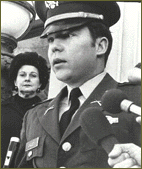 |
| intellectual stature would never have been issuing orders. |
|
| |
President Johnson's Decision Not to Run
Good evening, my Fellow Americans:
Tonight I want to speak to you of peace in Vietnam and Southeast Asia.
No other question so preoccupies our people. No other dream so absorbs the 250 million human beings who live in that part of the world. No other goal motivates American policy in Southeast Asia.
For years, representatives of our Government and others have traveled the world--seeking to find a basis for peace talks.
Since last September, they have carried the offer that I made public at San Antonio. That offer was this:
That the United States would stop its bombardment of North Vietnam when that would lead promptly to productive discussions--and that we would assume that North Vietnam would not take military advantage of our restraint.
Hanoi denounced this offer, both privately and publicly. Even while the search for peace was going on, North Vietnam rushed their preparations for a savage assault on the people, the government, and the allies of South Vietnam.
Their attack--during the Tet holidays--failed to achieve its principal objectives.
It did not collapse the elected government of South Vietnam or shatter its army--as the Communists had hoped.
It did not produce a "general uprising" among the people of the cities as they had predicted.
The Communists were unable to maintain control of any of the more than 30 cities that they attacked. And they took very heavy casualties.
But they did compel the South Vietnamese and their allies to move certain forces from the countryside into the cities.
They caused widespread disruption and suffering. Their attacks, and the battles that followed, made refugees of half a million human beings.
The Communists may renew their attack any day.
They are, it appears, trying to make 1968 the year of decision in South Vietnam--the year that brings, if not final victory or defeat, at least a turning point in the struggle.
This much is clear: If they do mount another round of heavy attacks, they will not succeed in destroying the fighting power of South Vietnam and its allies.
But tragically, this is also clear: Many men--on both sides of the struggle--will be lost. A nation that has already suffered 20 years of warfare will suffer once again. Armies on both sides will take new casualties. And the war will go on.
There is no need for this to be so.
There is no need to delay the talks that could bring an end to this long and this bloody war.
Tonight, I renew the offer I made last August--to stop the bombardment of North Vietnam. We ask that talks begin promptly, that they be serious talks on the substance of peace. We assume that during those talks Hanoi will not take advantage of our restraint.
We are prepared to move immediately toward peace through negotiations.
So, tonight, in the hope that this action will lead to early talks, I am taking the first step to de-escalate the conflict. We are reducing--substantially reducing--the present level of hostilities.
And we are doing so unilaterally, and at once.
Tonight, I have ordered our aircraft and our naval vessels to make no attacks on North Vietnam, except in the area north of the demilitarized zone where the continuing enemy buildup directly threatens allied forward positions and where the movements of their troops and supplies are clearly related to that threat.
The area in which we are stopping our attacks includes almost 90 percent of North Vietnam's population, and most of its territory. Thus there will be no attacks around the principal populated areas, or in the food-producing areas of North Vietnam.
Even this very limited bombing of the North could come to an early end--if our restraint is matched by restraint in Hanoi. But I cannot in good conscience stop all bombing so long as to do so would immediately and directly endanger the lives of our men and our allies. Whether a complete bombing halt becomes possible in the future will be determined by events.
Our purpose in this action is to bring about a reduction in the level of violence that now exists.
It is to save the lives of brave men--and to save the lives of innocent women and children. It is to permit the contending forces to move closer to a political settlement.
And tonight, I call upon the United Kingdom and I call upon the Soviet Union--as co-chairmen of the Geneva Conferences, and as permanent members of the United Nations Security Council--to do all they can to move from the unilateral act of de-escalation that I have just announced toward genuine peace in Southeast Asia.
Now, as in the past, the United States is ready to send its representatives to any forum, at any time, to discuss the means of bringing this ugly war to an end.
I am designating one of our most distinguished Americans, Ambassador Averell Harriman, as my personal representative for such talks. In addition, I have asked Ambassador Llewellyn Thompson, who returned from Moscow for consultation, to be available to join Ambassador Harriman at Geneva or any other suitable place--just as soon as Hanoi agrees to a conference.
I call upon President Ho Chi Minh to respond positively, and favorably, to this new step toward peace.
But if peace does not come now through negotiations, it will come when Hanoi understands that our common resolve is unshakable, and our common strength is invincible.
Tonight, we and the other allied nations are contributing 600,000 fighting men to assist 700,000 South Vietnamese troops in defending their little country.
Our presence there has always rested on this basic belief: The main burden of preserving their freedom must be carried out by them--by the South Vietnamese themselves.
We and our allies can only help to provide a shield behind which the people of South Vietnam can survive and can grow and develop. On their efforts--on their determination and resourcefulness--the outcome will ultimately depend.
That small, beleaguered nation has suffered terrible punishment for more than 20 years.
I pay tribute once again tonight to the great courage and endurance of its people. South Vietnam supports armed forces tonight of almost 700,000 men--and I call your attention to the fact that this is the equivalent of more than 10 million in our own population. Its people maintain their firm determination to be free of domination by the North.
There has been substantial progress, I think, in building a durable government during these last 3 years. The South Vietnam of 1965 could not have survived the enemy's Tet offensive of 1968. The elected government of South Vietnam survived that attack--and is rapidly repairing the devastation that it wrought.
The South Vietnamese know that further efforts are going to be required:
- --to expand their own armed forces,
- --to move back into the countryside as quickly as possible,
- --to increase their taxes,
- --to select the very best men that they have for civil and military responsibility,
- --to achieve a new unity within their constitutional government, and
- --to include in the national effort all those groups who wish to preserve South Vietnam's control over its own destiny.
Last week President Thieu ordered the mobilization of 135,000 additional South Vietnamese. He plans to reach--as soon as possible--a total military strength of more than 800,000 men.
To achieve this, the Government of South Vietnam started the drafting of 19-year-olds on March 1st. On May 1st, the Government will begin the drafting of 18-year-olds.
Last month, 10,000 men volunteered for military service--that was two and a half times the number of volunteers during the same month last year. Since the middle of January, more than 48,000 South Vietnamese have joined the armed forces--and nearly half of them volunteered to do so.
All men in the South Vietnamese armed forces have had their tours of duty extended for the duration of the war, and reserves are now being called up for immediate active duty.
President Thieu told his people last week:
"We must make greater efforts and accept more sacrifices because, as I have said many times, this is our country. The existence of our nation is at stake, and this is mainly a Vietnamese responsibility."
He warned his people that a major national effort is required to root out corruption and incompetence at all levels of government.
We applaud this evidence of determination on the part of South Vietnam. Our first priority will be to support their effort.
We shall accelerate the re-equipment of South Vietnam's armed forces--in order to meet the enemy's increased firepower. This will enable them progressively to undertake a larger share of combat operations against the Communist invaders.
On many occasions I have told the American people that we would send to Vietnam those forces that are required to accomplish our mission there. So, with that as our guide, we have previously authorized a force level of approximately 525,000.
Some weeks ago--to help meet the enemy's new offensive--we sent to Vietnam about 11,000 additional Marine and airborne troops. They were deployed by air in 48 hours, on an emergency basis. But the artillery, tank, aircraft, medical, and other units that were needed to work with and to support these infantry troops in combat could not then accompany them by air on that short notice.
In order that these forces may reach maximum combat effectiveness, the Joint Chiefs of Staff have recommended to me that we should prepare to send--during the next 5 months--support troops totaling approximately 13,500 men.
A portion of these men will be made available from our active forces. The balance will come from reserve component units which will be called up for service.
The actions that we have taken since the beginning of the year:
- --to reequip the South Vietnamese forces,
- --to meet our responsibilities in Korea, as well as our responsibilities in Vietnam,
- --to meet price increases and the cost of activating and deploying reserve forces,
- --to replace helicopters and provide the other military supplies we need, all of these actions are going to require additional expenditures.
The tentative estimate of those additional expenditures is $2.5 billion in this fiscal year, and $2.6 billion in the next fiscal year.
These projected increases in expenditures for our national security will bring into sharper focus the Nation's need for immediate action: action to protect the prosperity of the American people and to protect the strength and the stability of our American dollar.
On many occasions I have pointed out that, without a tax bill or decreased expenditures, next year's deficit would again be around $20 billion. I have emphasized the need to set strict priorities in our spending. I have stressed that failure to act and to act promptly and decisively would raise very strong doubts throughout the world about America's willingness to keep its financial house in order.
Yet Congress has not acted. And tonight we face the sharpest financial threat in the postwar era--a threat to the dollar's role as the keystone of international trade and finance in the world.
Last week, at the monetary conference in Stockholm, the major industrial countries decided to take a big step toward creating a new international monetary asset that will strengthen the international monetary system. I am very proud of the very able work done by Secretary Fowler and Chairman Martin of the Federal Reserve Board.
But to make this system work the United States just must bring its balance of payments to--or very close to--equilibrium. We must have a responsible fiscal policy in this country. The passage of a tax bill now, together with expenditure control that the Congress may desire and dictate, is absolutely necessary to protect this Nation's security, to continue our prosperity, and to meet the needs of our people.
What is at stake is 7 years of unparalleled prosperity. In those 7 years, the real income of the average American, after taxes, rose by almost 30 percent--a gain as large as that of the entire preceding 19 years.
So the steps that we must take to convince the world are exactly the steps we must take to sustain our own economic strength here at home. In the past 8 months, prices and interest rates have risen because of our inaction.
We must, therefore, now do everything we can to move from debate to action--from talking to voting. There is, I believe--I hope there is--in both Houses of the Congress--a growing sense of urgency that this situation just must be acted upon and must be corrected.
My budget in January was, we thought, a tight one. It fully reflected our evaluation of most of the demanding needs of this Nation.
But in these budgetary matters, the President does not decide alone. The Congress has the power and the duty to determine appropriations and taxes.
The Congress is now considering our proposals and they are considering reductions in the budget that we submitted.
As part of a program of fiscal restraint that includes the tax surcharge, I shall approve appropriate reductions in the January budget when and if Congress so decides that that should be done.
One thing is unmistakably clear, however: Our deficit just must be reduced. Failure to act could bring on conditions that would strike hardest at those people that all of us are trying so hard to help.
These times call for prudence in this land of plenty. I believe that we have the character to provide it, and tonight I plead with the Congress and with the people to act promptly to serve the national interest, and thereby serve all of our people.
Now let me give you my estimate of the chances for peace:
- --the peace that will one day stop the bloodshed in South Vietnam,
- --that will permit all the Vietnamese people to rebuild and develop their land,
- --that will permit us to turn more fully to our own tasks here at home.
I cannot promise that the initiative that I have announced tonight will be completely successful in achieving peace any more than the 30 others that we have undertaken and agreed to in recent years.
But it is our fervent hope that North Vietnam, after years of fighting that have left the issue unresolved, will now cease its efforts to achieve a military victory and will join with us in moving toward the peace table.
And there may come a time when South Vietnamese--on both sides--are able to work out a way to settle their own differences by free political choice rather than by war.
As Hanoi considers its course, it should be in no doubt of our intentions. It must not miscalculate the pressures within our democracy in this election year.
We have no intention of widening this war.
But the United States will never accept a fake solution to this long and arduous struggle and call it peace.
No one can foretell the precise terms of an eventual settlement.
Our objective in South Vietnam has never been the annihilation of the enemy. It has been to bring about a recognition in Hanoi that its objective--taking over the South by force--could not be achieved.
We think that peace can be based on the Geneva Accords of 1954--under political conditions that permit the South Vietnamese--all the South Vietnamese--to chart their course free of any outside domination or interference, from us or from anyone else.
So tonight I reaffirm the pledge that we made at Manila--that we are prepared to withdraw our forces from South Vietnam as the other side withdraws its forces to the north, stops the infiltration, and the level of violence thus subsides.
Our goal of peace and self-determination in Vietnam is directly related to the future of all of Southeast Asia--where much has happened to inspire confidence during the past 10 years. We have done all that we knew how to do to contribute and to help build that confidence.
A number of its nations have shown what can be accomplished under conditions of security. Since 1966, Indonesia, the fifth largest nation in all the world, with a population of more than 100 million people, has had a government that is dedicated to peace with its neighbors and improved conditions for its own people. Political and economic cooperation between nations has grown rapidly.
I think every American can take a great deal of pride in the role that we have played in bringing this about in Southeast Asia. We can rightly judge--as responsible Southeast Asians themselves do--that the progress of the past 3 years would have been far less likely--if not completely impossible--if America's sons and others had not made their stand in Vietnam.
At Johns Hopkins University, about 3 years ago, I announced that the United States would take part in the great work of developing Southeast Asia, including the Mekong Valley, for all the people of that region. Our determination to help build a better land--a better land for men on both sides of the present conflict--has not diminished in the least. Indeed, the ravages of war, I think, have made it more urgent than ever.
So, I repeat on behalf of the United States again tonight what I said at Johns Hopkins--that North Vietnam could take its place in this common effort just as soon as peace comes.
Over time, a wider framework of peace and security in Southeast Asia may become possible. The new cooperation of the nations of the area could be a foundation-stone. Certainly friendship with the nations of such a Southeast Asia is what the United States seeks--and that is all that the United States seeks.
One day, my fellow citizens, there will be peace in Southeast Asia.
It will come because the people of Southeast Asia want it--those whose armies are at war tonight, and those who, though threatened, have thus far been spared.
Peace will come because Asians were willing to work for it--and to sacrifice for it--and to die by the thousands for it.
But let it never be forgotten: Peace will come also because America sent her sons to help secure it.
It has not been easy--far from it. During the past 4 years, it has been my fate and my responsibility to be Commander in Chief. I have lived---daily and nightly--with the cost of this war. I know the pain that it has inflicted. I know, perhaps better than anyone, the misgivings that it has aroused.
Throughout this entire, long period, I have been sustained by a single principle: that what we are doing now, in Vietnam, is vital not only to the security of Southeast Asia, but it is vital to the security of every American.
Surely we have treaties which we must respect. Surely we have commitments that we are going to keep. Resolutions of the Congress testify to the need to resist aggression in the world and in Southeast Asia.
But the heart of our involvement in South Vietnam--under three different presidents, three separate administrations--has always been America's own security.
And the larger purpose of our involvement has always been to help the nations of Southeast Asia become independent and stand alone, self-sustaining, as members of a great world community--at peace with themselves, and at peace with all others.
With such an Asia, our country--and the world--will be far more secure than it is tonight.
I believe that a peaceful Asia is far nearer to reality because of what America has done in Vietnam. I believe that the men who endure the dangers of battle--fighting there for us tonight--are helping the entire world avoid far greater conflicts, far wider wars, far more destruction, than this one.
The peace that will bring them home someday will come. Tonight I have offered the first in what I hope will be a series of mutual moves toward peace.
I pray that it will not be rejected by the leaders of North Vietnam. I pray that they will accept it as a means by which the sacrifices of their own people may be ended. And I ask your help and your support, my fellow citizens, for this effort to reach across the battlefield toward an early peace.
Finally, my fellow Americans, let me say this:
Of those to whom much is given, much is asked. I cannot say and no man could say that no more will be asked of us.
Yet, I believe that now, no less than when the decade began, this generation of Americans is willing to "pay any price, bear any burden, meet any hardship, support any friend, oppose any foe to assure the survival and the success of liberty."
Since those words were spoken by John F. Kennedy, the people of America have kept that compact with mankind's noblest cause.
And we shall continue to keep it.
Yet, I believe that we must always be mindful of this one thing, whatever the trials and the tests ahead. The ultimate strength of our country and our cause will lie not in powerful weapons or infinite resources or boundless wealth, but will lie in the unity of our people.
This I believe very deeply.
Throughout my entire public career I have followed the personal philosophy that I am a free man, an American, a public servant, and a member of my party, in that order always and only.
For 37 years in the service of our Nation, first as a Congressman, as a Senator, and as Vice President, and now as your President, I have put the unity of the people first. I have put it ahead of any divisive partisanship.
And in these times as in times before, it is true that a house divided against itself by the spirit of faction, of party, of region, of religion, of race, is a house that cannot stand.
There is division in the American house now. There is divisiveness among us all tonight. And holding the trust that is mine, as President of all the people, I cannot disregard the peril to the progress of the American people and the hope and the prospect of peace for all peoples.
So, I would ask all Americans, whatever their personal interests or concern, to guard against divisiveness and all its ugly consequences.
Fifty-two months and 10 days ago, in a moment of tragedy and trauma, the duties of this office fell upon me. I asked then for your help and God's, that we might continue America on its course, binding up our wounds, healing our history, moving forward in new unity, to clear the American agenda and to keep the American commitment for all of our people.
United we have kept that commitment. United we have enlarged that commitment.
Through all time to come, I think America will be a stronger nation, a more just society, and a land of greater opportunity and fulfillment because of what we have all done together in these years of unparalleled achievement.
Our reward will come in the life of freedom, peace, and hope that our children will enjoy through ages ahead.
What we won when all of our people united just must not now be lost in suspicion, distrust, selfishness, and politics among any of our people.
Believing this as I do, I have concluded that I should not permit the Presidency to become involved in the partisan divisions that are developing in this political year.
With America's sons in the fields far away, with America's future under challenge right here at home, with our hopes and the world's hopes for peace in the balance every day, I do not believe that I should devote an hour or a day of my time to any personal partisan causes or to any duties other than the awesome duties of this office--the Presidency of your country.
Accordingly, I shall not seek, and I will not accept, the nomination of my party for another term as your President.
But let men everywhere know, however, that a strong, a confident, and a vigilant America stands ready tonight to seek an honorable peace--and stands ready tonight to defend an honored cause--whatever the price, whatever the burden, whatever the sacrifice that duty may require.
Thank you for listening.
Good night and God bless all of you.
President Lyndon B. Johnson - March 31, 1968
|
|
|
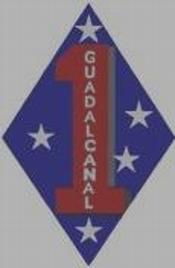 |
| 1st Marine Division Website. |
|
|
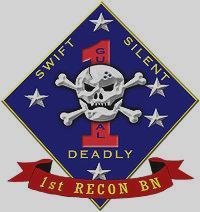 |
| 1st Reconnaissance Battalion Website |
|
|
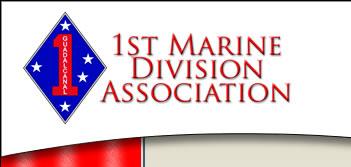 |
| Click for Website |
|
|
1st Reconnaissance Battalion Association Website
Click Here
|
 |
| Click for Index page |
|
|
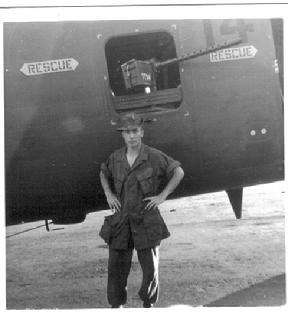 |
| Thanks for Stopping By |
|
|
 |
| Click for Home page 1st Recon Bn.com |
|
|
Categories within this 1st Reconnaissance Battalion website.
1st Recon Bn.com Home page, My Missions in Nam (Coming soon), Photos of 1st Recon Battalion in Nam, Recon Missions the units Patrol Reports 1968-1969 (coming soon), A Summer Day in Nam - My Story (Coming soon), Recon 1 The War, Recon 2 Tet Offensive in Nam 1968, Tet Offensive in Nam 1969 (Coming soon), Recon 3 Vietnam War Timeline, Recon 4 President Richard M. Nixon's Report on Vietnam, Recon 5 1950's US send troops to Vietnam, Recon 6 The French Foreign Legion in Vietnam, Recon 7 Hill 200 my story with photos (Coming soon), Recon 8 - Maps & Artifacts - The Time Capsule (Coming soon), Recon 9 1st Recon Battalion Units photos, Recon 10 Sounds from Nam (Coming soon), Recon 11 Reunion Photos, Recon 12 Helicopters in Nam, Recon 13 1st Recon Bn. Awards & Decorations, Recon 14 Navy & Marine Corps Awards and Decorations, Recon 15 Marine Corps Awards & Decorations, Recon 16 Personal Awards & Decorations, Recon 17 Information on Unit Awards, Recon 18 The Memory Remains Not All Wounds Are Visible, Recon 19 Purple Heart (Coming soon) & Recon 20 Vietnam Footage & Memorials, Vietnam Memorials & Monuments part 2 No Man Left Behind part 1, No Man Left Behind part 2, No Man Left Behind part 3 (Coming soon) ,1st Recon Bn.com Photo Gallery , 1st Recon Bn. Association Messages, 1st Marine Division Association Messages, Battles of the Vietnam War, Hamburger Hill, Vietnam 1968, Vietnam 1969, Vietnam Today, The Day The Eagle Cried, My Message Board.
|
|
|
Index
Categories within 1st Recon Bn
Click the index for the Index page. |
| |
 |
| Email me with your feedback on how I can Improve this website. |
|
|
|